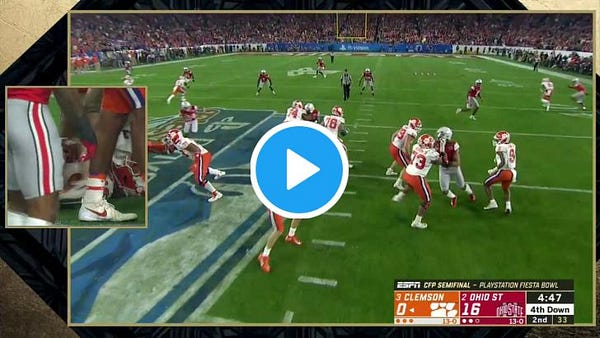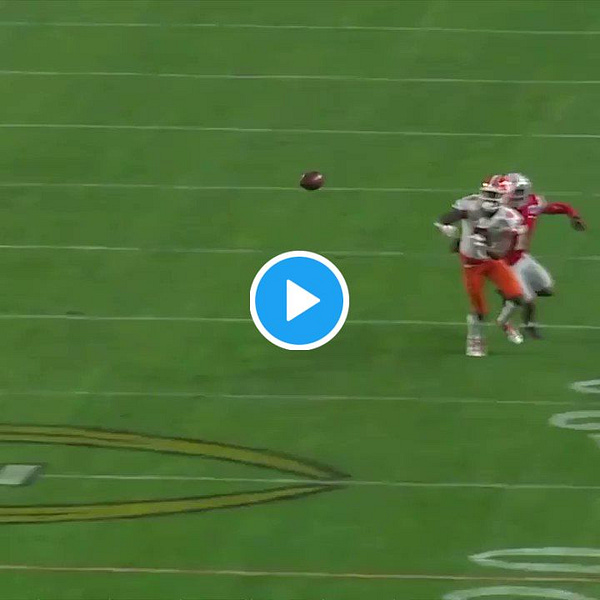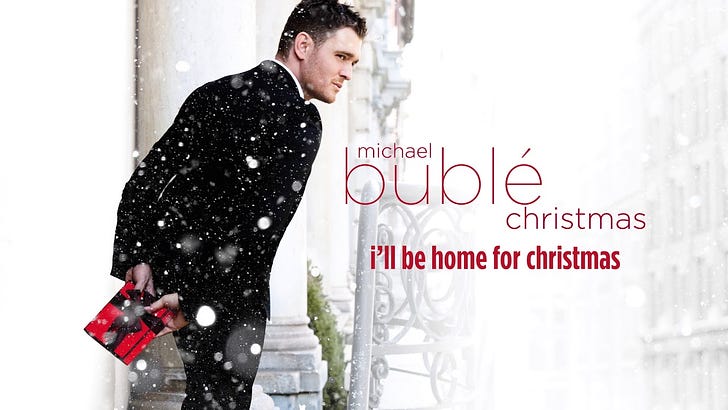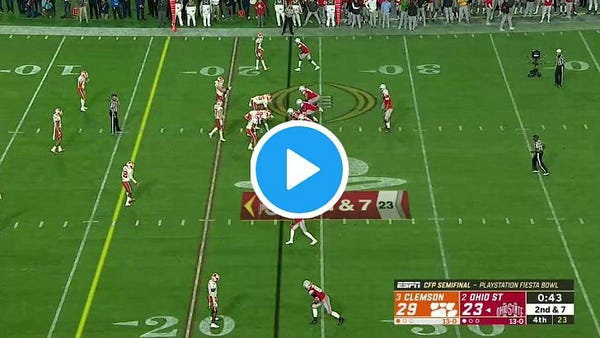I'll be home for Christmas
You can plan on me
Please have snow and mistletoe
And presents by the tree
Christmas eve will find you
Where the love light gleams
I'll be home for Christmas
If only in my dreams
I didn’t go “home” for Christmas, mostly because it’s only in my dreams.
Christmastime was hardly ever fun for me, growing up. Mostly, I spent the holidays walking on eggshells, pretending everything was OK. It wasn’t. Money was always tight; my parents worked extremely hard at shielding my sister and I from the worst of it, but kids always know. My mom and dad were always brittle, tense, exhausted; and the older I got, the harder it was to play along with their fragile cheer. This isn’t to their discredit; they did their best — but kids always know.
What I wanted wasn’t a gift, or even a series of gifts — though I didn’t know that at the time. What I wanted was, instead, a feeling: a sense of ease, of welcome, of kindness. Not ever being a kind man, my stepdad was singularly incapable of delivering that feeling, then or at any other time.* That’s not the kind of thing you can substitute for with gifts, or with forced bonhomie, hard as my parents tried.
I’ve spent much of my adult life looking for that feeling. I think a lot of us are, which probably explains the enduring popularity of Christmas movies, whether it’s classics like It’s A Wonderful Life, or the entirety of the Netflix Christmas Cinematic Universe. We’re socialized into thinking that, unless there’s a tree and presents and dozens of relatives milling about, it’s not Christmas™.
And yet: the wonderful thing about life is how rough and unscripted it is. The last couple of years, I’ve spent Christmas hanging out by myself, taking care of my cats while my former partner (with whom they live) visits her family upstate. This isn’t a “sad” thing; it’s how things have spun out, mostly because I’ve made those choices. I haven’t seen my own family during the holidays since the beginning of this decade, mostly because I got tired of making nice just to avoid conflict with a man I tired of placating.
Is that sad? Sure. I wish I had the kind of relationship with my parents that most of my friends seem to have — the “normal” kind of screwed-up where you argue with them, and fight with them, and they argue with you, and fight with you, and maybe you tease each other about your flaws, but at the end of it all you know you love them, and you can confide in them, and you want to spend time with them because you like them as people, and they like you as a person.
In short: being friends with your mom and dad.
I don’t have that, and I never will. And that’s OK, because how can you have that kind of relationship with a man who punches you and beats you with a timing belt, and robs you of your innocence? And can you have it with a woman who looks the other way out of self-preservation?
I’ve spent the better part of this decade working through all this…shit. And acknowledging it happened, and how it shaped me, and ultimately working through it. And part of that work was coming to terms with the fact that I wasn’t going to be friends with my mom and dad. That was rough, and it still leaves me aching, but it’s better than pretending otherwise.
So I spend Christmastide with Hector and Hobbes, petting Hector when he’ll let me, and Hobbes a lot more. I walk the streets, looking at people walking arm in arm, and wonder when that will be me, if ever again. I’m Jewish, so my actual celebration of the day involves movies and basketball and Chinese food with my friend Sam, for which I’m grateful. I catch up on books I I’ve half-read, and TV shows I’ve let slip.
The holidays were meaningful for me this year because I fully celebrated Hanukkah. I didn’t grow up Jewish. My stepdad was an evangelical Christian, I attended Catholic school, and we attended services at my town’s Presbyterian church. I didn’t embrace my Jewish roots until I was in the Army, and had a chance to explore Judaism with my therapist and various rabbis in Colorado.
It’s a work in progress, like so much of life. I’ve gotten into the rhythm of observing the High Holy Days (Rosh Hashanah, Yom Kippur, and the ten days including those holidays, known also as the Ten Days of Repentance (Aseret Yemei Teshuvah)). They’re deeply meaningful to me, because it’s a chance to reset.
Hanukkah isn’t a major holiday on the calendar. It gets treated that way here in the States, because it tends to coincide with Christmas, more or less, and it’s an occasion to hand out gifts. But I’ve never really celebrated it, until this year. I got a menorah, I lit the candles, said the prayers.
Anyway: this Hanukkah is also full of tragedy, because there’s been an anti-Semitic attack on every single day of the holiday, thus far. That culminated with Saturday’s horrific attack on a Hanukkah party in Monsey, NY (about an hour outside New York City). You can find the horrible details elsewhere; I won’t reiterate them. The upshot is that New York City Mayor Bill de Blasio’s ordered the NY Police Department to step up patrols in historically Jewish neighborhoods in the city, and the Guardian Angels (yes, they still exist!) are joining in, not that anyone was asking them to.
Not to be outdone, Rep. Max Rose weighed in:

As Jews, we’ve seen the rising tide of hatred gathering since President Trump took office. It’s an extremely fraught subject. I’m uncomfortable talking about it, because my Jewish experience is very different from other people’s. But the question reverberating around is simple:
How can we be safe as Jews?
I want to be crystal clear that I don't have answers to this question, and all the ones surrounding it, and I'm very skeptical of anyone who does. That said, I think my friend Elad put the question at the heart of all this quite succinctly:
I keep seeing people on the Jewish left say “do you really trust the police to keep us safe?” Wrong question. They probably will. What I want to hear you ask is “If the police keep you safe at somebody else’s expense, do you accept?!”
Because that's basically what we're talking about here. If we're asking - like Rep. Max Rose did - to deploy the awesome resources of the state to protect ourselves, we also need to ask at whose expense this will come. For me, the only way we get through this is through solidarity: working together, hand in hand, and recognizing that we are all members of marginalized communities.
I'll say it: for white Jews, and for white-passing Jews like myself, especially those who've assimilated thoroughly into American society, this is a foreign feeling. I'll be the first to admit that, even though I consider myself a person of color, and I identify as such, most people will look at me and consider me a white person -- and I've benefited from that. I have not had the experiences my cousins and friends who are Black and Brown have had with police, and the mechanisms of authority.
That's why I've consistently leaned into that privilege, and taken advantage of it in order to protect and defend my friends and family who lack that privilege. This is one of those times.
I don't accept that I must be kept safe at someone else's expense. I don’t feel we deserve it more. We need it, but not more so. If we can effectively provide protection for the most vulnerable groups, protection will come more easily for the rest of us. This is what it means to be in solidarity. Let’s be real: we do know which groups are the most vulnerable, even if many don’t want to admit it.
For what it's worth, I’m not sure which protection would be best. I don’t trust our current structures and institutions, especially given my experiences working the last two-plus years with those institutions; protection is necessary, but it's going to come from within, not without.
I’ll say this: it's certainly not going to come from a vigilante group that's implicitly white supremacist at heart, and is both a relic of the years when New York City consciously gave in to those fears, and both explicitly and implicitly feeds on the fears of white people towards the Other.
Sportsball
Well, that was a hell of a game Saturday night between Clemson and Ohio State. It’s both cruel and fitting that it was decided on an error by the Buckeyes’ Justin Fields and Chris Olave.
Let’s be honest, though: Ohio State should have won that game. They blitzed out to a 16-0 lead, and it should’ve been more. The key word there is “should”, and New Orleans Saints fans probably know where I’m going with this.
It’s considered gauche to blame referees for your team’s defeat, but if there’s been a running theme in all of sports in 2019, it’s the consistent incompetence of game officials in key games — particularly in American football. The refs hosed the Saints in the NFC title game at the beginning of the year - literally forcing the NFL to review how pass interference calls were or, rather, weren’t made - so it’s only natural that we’d close the year talking about refs in another playoff game, this time on the college football end.
On three different occasions, the replay officials made a call that shifted the flow of the game to Clemson’s benefit. The first came in with about 7:30 to go in the second quarter, when the Buckeyes were forced to settle for another short Haubeil field goal, this time from 22 yards, after what initially appeared to be an 8-yard touchdown catch for Dobbins on 3rd-and-goal was ruled incomplete upon replay review.
That left the score at 13-0. OSU tacked on another field goal to extend the lead to 16-0, and even though the Clemson Tigers defense held strong to prevent the Buckeyes from scoring touchdowns on all three trips to the red zone, it sure felt like all the momentum was with Ohio State.
Then the replay booth made their second critical call to tip momentum Clemson’s way:


That’s…not a targeting foul. If you’re going to call a penalty there - and none of the referees on the field did - it’s roughing the passer. The difference, and this is key, is that the former meant Shaun Wade was ejected. His replacement, Amir Riep, was called for defensive pass interference on the next set of downs. That meant Clemson broke through for its first points of the game with 2:45 to play in the second quarter on an 8-yard Travis Etienne touchdown run, cutting the lead to 16-7.
The momentum shift was palpable: the Tigers defense held OSU to its first three-and-out of the game, and the offense managed to notch another touchdown to make the score 16-14 at halftime.
But let’s go back to Wade’s foul. The reason it’s not targeting for me is because of what Clemson QB Trevor Lawrence does as he’s getting hit: he instinctively balls up to absorb the hit, which means that his helmet clashes with Wade’s. Watch the replay above to see what I mean.
Neither player is at fault here. The fault is entirely on the replay officials, who should be exercising restraint before making calls, let alone calls that result in an entire game changing course, and a player getting ejected. Incredibly, that’s not even the most egregious call they made.
This was:


So this is pretty straightforward, right? Fumble, scoop, score.
Nope, not even close. Not according to the replay booth, which overturned the call on the field, calling this an incomplete pass, and not according to head official Ken Williamson.
I mean…where do we even fucking begin? Clemson’s Justyn Ross takes not one, not two, not three, but FOUR STEPS with the ball firmly in his hands before it’s jarred loose by Ohio State’s Jeff Okudah. If that’s an “incomplete pass”, then catches have no meaning. But, hey, let’s hear Williamson’s explanation:
Fiesta Bowl referee Ken Williamson met with the media following the game, and he stood by the call.
"We had a lot of good looks on it," Williamson said. "We put on fast motion and slow motion. The player did not complete the process of the catch, so, therefore, the pass was incomplete."
When asked for clarification, Williamson said the receiver lost control of the ball and did not complete the process of the catch when he moved.
"After the video, instant replay in the stadium as well as back at the video center, they both looked at it slow and fast and they determined when he moved, the ball was becoming loose in his hands and he did not complete the process of the catch," Williamson said. (emphasis added)
I mean…what in the hell? The ball “becoming loose in his hands” describes literally every fumble ever. That’s a non-sensical explanation that just asks us to accept bullshit as if it were caviar, and I’m not having it.
Whether it’s football or soccer, in 2019 replay officials have routinely engaged in the most absurd contortions to justify calls they really should’ve just left alone, and that gets to the fundamental question of video replay officials:
What’s their purpose? Are they there to redress clearly mistaken calls made on the field? Or are they there to ensure perfect adherence to the rules, such as it is? You’d think it’s the former, but really, we’re seeing that it’s the latter.
The problem with that is that the latter is now clearly perverting not just the flow of games, but the result. We see it every time that a goal in the English Premier League gets annulled because some player’s pinky finger is fractionally offside. We saw it Saturday, when what literally millions of people thought was a catch and a fumble wasn’t, mostly because middle-aged men sitting in a booth could pause and rewind 27 times and talk themselves into seeing something literally no one else saw.
Look, there’s a place for replays. But not like this. This is just ruining games.
It’s been a rough year. Let’s take care of each other. I love all of you, and I hope that’s reciprocal. I’ll be ringing in the New Year by myself, most likely, so I’ll close with a wish for a better, happier year to come than the one we’ve just had.
If 2019 was excellent for you, then I hope that 2020 might be even more so; if 2019 was fraught for you, as it was for so many of us, then I hope and pray that 2020 might bring peace, and love, and joy for us all.
Should auld acquaintance be forgot,
and never brought to mind?
Should auld acquaintance be forgot,
and auld lang syne?
For auld lang syne, my jo,
for auld lang syne,
we'll tak' a cup o' kindness yet,
for auld lang syne.



